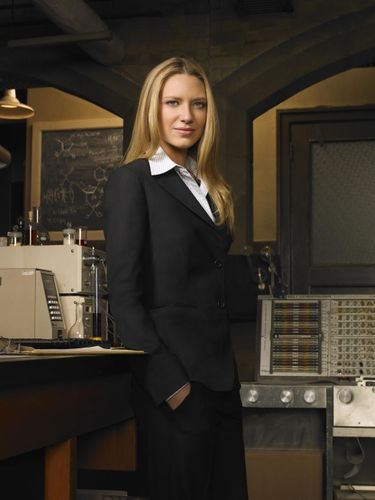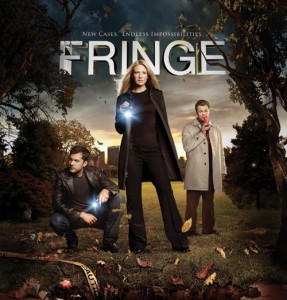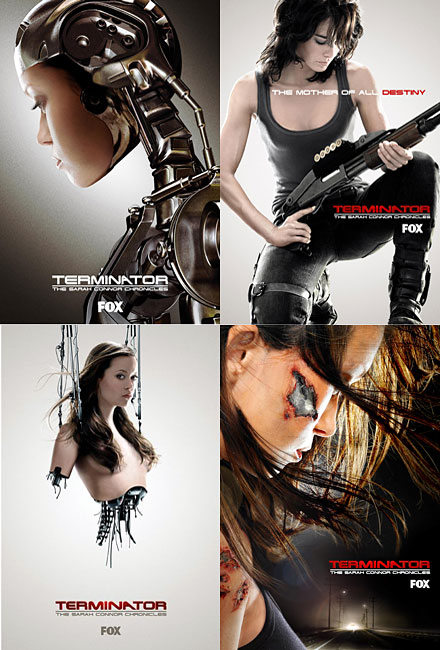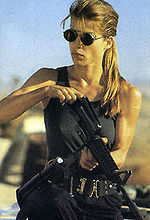
October 22, 2009
oo, interesting
Posted by dogpossum on October 22, 2009 9:25 PM | Comments (0)
I just discovered Jasika Nicole, the actress who plays Astrid, is gay. She is also a scribbler and she has a blog.
"oo, interesting" was posted in the category fringe
October 19, 2009
adventures with badass sistahs in outer space: olivia dunham
Posted by dogpossum on October 19, 2009 9:43 PM | Comments (1)
I love SF telly. I love it. I watch every SF program, just in case. I also like supernatural, fantasy and general make believe stuff.
But I tend to have less patience with programs that do not have good female characters. I make exceptions for programs like Supernatural which explore male characters and masculinity in new ways.
I love all trashy vampire telly. I can't help it. It's a sickness.
I did my honours thesis on female violence in action film, and I'm still interested in the way women and violence and, more importantly, women's violence are depicted in mainstream film and television. While I was doing this honours project I came across an article which basically argued that straight-to-video releases (ie B films) were often more transgressive in terms of representations of gender than mainstream or A films. I am really interested in this idea. This is partly how I justify my passion for B telly. Partly. But I also think it's true. Telly that doesn't gain broadcast telly release, doesn't make it to prime time, or even make it to Australian television tends to be where I find the most interesting gender stuff. It's as though being B gives you a little freedom to explore different types of characters.
I gain access to these programs through the internet, and through video shops. Video shops are actually very important. DVD releases of even the most B programs has given me access to some of the most wonderfully un-top-shelf television. Accessing these programs this way (rather than via broadcast telly) means that I tend to watch them in a block, rather than one episode-per-week. I binge view. This changes the way that I read these programs. It makes me more likely to read the meta-arc, the larger story. I tend to regard individual episode stories as pieces of a whole, rather than as discrete texts. Even when the program is very 'monster of the week' (as most SF is, particularly in its first season).
I find out about these programs via websites like io9. I use wikipedia extensively to clear up plot points I haven't understood or to follow up characters and add-on texts like comics. I also use imdb for details about directors, actors and so on. I like to talk about these programs with other people, but I don't particularly want to sit down and dissect them for hours. This was something I used to do with Buffy when I was at school. These days I quite like to share programs and to mention them, or to share add-on texts, but I'm really only interested in watching them. I do talk about them with my partner when we're watching. But only the programs he's also interested in.
My PhD dissertation involved a lot of research into fan studies and methodologies and theories involved in researching fan cultures. I am self-reflexive about most of my talk about these SF telly shows. I am interested in issues of gender and class and sexuality and race and ethnicity.... and all that good identity stuff. But I am also interested in questions about technology and machinery, wider questions about humanity. But, really, gender is where it's at; all that other shit is inflected by this. And, as somebody clever said once, I'll be a post-feminist when we live in a post-patriarchy. Gender issues are so central to SF culture and texts, it's ridiculously self-deceiving to try to ignore them.
This is just one post about one character (mostly) that I like. I'll try to write other posts about other characters. And perhaps about this program in more detail. But don't count on it; I'm slack.
Because I tend to watch a number of programs at one time, and am also reading SF all the time, I tend to read intertextually. Well, of course I do. We all do. But this is one of my particular pleasures; I like to imagine characters from different programs meeting. I like exploring the industrial connections between programs - how could the director of Veronica Mars move to Moonlight and what happens when Mark Mothersbaugh does the music for Big Love. Oh - I also read and watch across genres. I'm reading lots of dodgy supernatural romances most of the time, and always reading Tanya Huff; I'm watching programs like Vampire Diaries and, of course, Blood Ties.
So when I'm watching these programs I'm not only reading the text in front of me, I'm also thinking intertextually, I'm thinking about modes and industries of production, and I'm paying attention to audiences and modes of reception. And the communities which tie them all together.
And I re-watch and re-read on a massive scale.
I also do some sessional teaching at various universities. I exploit this role by pushing the television I love on young, vulnerable middle class kiddies. I do, unapologetically and with great verve, present these programs in a feminist light. I have no - as in zero - tolerance for anti-feminist arguments from my classes. I will listen to them and then dismiss them as they deserve. I aim to indoctrinate a generation of students. They will be feminist and they will value SF.
They can just suck it up or fail.
So here's some stuff about Olivia Dunham. Main character of Fringe. All-round badass sistah. Mos def.
First, watch this:
That's a Fringe promo. The blonde is Olivia Dunham.
I'm really liking the character Olivia Dunham in Fringe. I especially liked her in the first season of the program. Why?
She's a crack shot. She is really, really good with a gun.
She's a good fighter. She wins most fights, and when she doesn't win, it's only because her opponent is, I dunno - a car or something.
She's super clever and figures things out. There are lots of things to figure out in Fringe.
She's a good explainer. Because she's a good figure-er-outer, she often has to explain things to other characters. Usually her male partner Charlie, but also quite often her boss.
She listens and thinks and listens again. She's not always flapping her lips, yapping. She's listening.
She's a good runner and jumper.
She's very gentle and patient with Walter, who's not only a habitual drug user (and abuser) but a mentally unwell older man who's been quite seriously damaged by his time in an institution. She listens to him and pays attention to him; she doesn't patronise him. She protects him when he needs it (and when he asks), but she is also willing to let him take care of himself.
She used to be a prosecutor in the military. She investigated and then prosecuted a middle aged white man who later became her boss. He was charged with sexually assaulting a number of women. When he became her boss, he sought revenge on her through systematic harassment. She didn't take that crap; she kept on being a badass agent. She didn't martyr herself; she called him on his bullshit. Her usual boss was this bad boss's friend. At first he didn't want to like Olivia because of this. Eventually he figured out Olivia was a gun, and that his friend was crap. Then he became a better boss. Olivia kept on being a gun, regardless.
She's willing to tell bosses off if they need it. She's also prepared to listen and to admit she was wrong.
She really likes her sister and her little niece.
She had good, solid, platonic relationships with her male coworkers. There is never even the intimation of sexual tension between her and (the awesome) Charlie. They are partners in the truest sense. He has a wife he loves and Olivia is busy being... Olivia.
She operates in an all-male world - the FBI (or is it CIA? Whatevs - some institution) - but she is aware of gender issues and articulates them. Most especially in her dealings with the bad boss. But she also makes comments about men in positions of power who can't handle assertive women. She has one great line in the first season about how the men around her (especially her male boss) aren't listening to her because she's 'getting emotional, just like a woman'. And then she says something, very sternly, about how she is getting emotional, because this is emotional stuff, and that this emotion is making her a better agent. Olivia is not only calling the men around her on their mysogynist bullshit, she's also reworking the role of 'great agent' to incorporate a range of characteristics not traditionally located in the male arse.
And she is a fully sick agent.

Throughout season one she is the main character. She is the centre of stories, and as the agent in charge, she is also boss of the cases they work. She's the one to call the lab and tell them to get their gear and come investigate something gross. This changes a little in season two, and she is set up as something of a victim (recovering from a 'car accident'), but this is changing. We are at about episode four, and she's already back on her feet and kicking arse. Peter has taken on a more managerial role in the group, and the 'Fringe division' has officially been disbanded. Charlie has [SPOILER] died [/SPOILER], which sucks arse, but I'm dealing. So Olivia's status has shifted. But this is ok, as Peter's character has only slowly been working away from 'carer' for Walter and 'general slacker' towards some sort of three dimensional personhood. He's also finally realising his abilities as an investigator type person. In other words, his character is gradually being fleshed out. I worry that he'll become Olivia's partner (in the sense of FBI ness and in the romantic sense), but I don't see this happening any time soon.
I really like Olivia because I don't worry about her. She's kind of superhuman, but only in the way we expect our SF protagonists to be. She gets scraped and banged and shot occasionally, but it doesn't stop her winning. Sure, she's kind of a paragon of all things awesome, but this is as it should be in SF. She is, however, flawed. And [SPOILER] probably partly psychic and awesome because she was experimented on as a kid. But she has begun dealing with this history and is assimilating and coming to terms with its effects in a phenomenally healthy way. Which in itself is a bit worrying.
Olivia is an impossible woman. An impossible character. But this is as it should be in SF. This is how SF protagonists are: they are strong and brave and clever. Cleverness is important. She is conventionally attractive, but she doesn't wear booby shirts or stupid shoes. She can run like a badass mofo and she likes suits. Just like the male agents around her. She wears her hair tied back in a piggy tail, or she wears a sensible black beanie. She doesn't wear much make up. She is conventionally attractive. But so are most protagonists.
I <3 Olivia.

Olivia isn't the only woman character in Fringe worth loving. I also love Astrid, who's the agent assigned to working with Walter in his lab.
Astrid is also awesome.
She has a degree in cryptography, another in computer stuff (or is that a double major) and she's got some sort of medical training (well, she does now). She loves cryptography. As in, she's a nerd for it. And she loves computers.
She's also an agent.
She calls Walter on his bullshit, including his inability to remember her name (which we suspect is a ploy on Walter's part). She won't let him (or anyone else) forget that she is actually a badass agent as well.
She deals with Walter's gross dissections and experiments very matter of factly.

She runs errands and also has some badass ninja agent skills.
She veers into 'servant territory' every now and then, which is particularly worrying as she's African American. But these little deviations are usually addressed: Astrid will call bullshit on Walter's behaviour and regularly refuses tasks she feels cross the boundary from professional assistance to nurse maiding.
She is super smart.
She and Olivia talk regularly about things other than men. They often figure out puzzles together.

She is fond of Walter and also deals with his mental illness and fragile personality gently, yet without patronising him. She does not take on a carer role; she is, if nothing else, Walter's lab assistant.
Nina Sharp is another important female character in Fringe. She's the CEO of Massive Dynamic, a sort of super-corporation specialising in technology. A bit like Skynet Cyberdyne Systems, but awesomer. She admires Olivia greatly and has tried to recruit her to Massive Dynamic a number of times. She and Olivia have a refreshingly realistic relationship; they deal with each other as professionals. They do not have the sort of antagonistic rivalry alpha women are usually given in SF... in telly.They talk to each other about plenty of things besides men. They often talk about technology together. And science.
Nina Sharp is middle aged.
Nina Sharp has a bionic arm and a clear glass ipod thingy. She is way cool with technology generally. This is one middle aged woman who is not relegated to earth mother status; she is technology, economic and industrial power and smarts.
I love Olivia the most, though. I love the way she stops and thinks about things. I love the way she can fighty fight. I love it that though she might, one day be interested in Peter romantically, that day is waaaaaay off in the future, and for now she's busy being a badass. He thinks she's neat. He might think she's neat in a romantic way, but for now he just thinks she's a badass and he wants to be her partner, I think.
So I love Olivia Dunham. And this is why I can watch Fringe.
PS: I'll try to add some more pics to this later, when I can figure out how to do it in this new version of MT without opening a new stupid window every time.
EDIT: I had to add this link to a drawing Jasika Nicole (the actor who plays Astrid) drew of herself.
"adventures with badass sistahs in outer space: olivia dunham" was posted in the category academia and buffy and angel and digging and fringe and teaching and television and veronica mars
April 12, 2009
television round up
Posted by dogpossum on April 12, 2009 11:16 PM | Comments (0)

1. Dollhouse is crap.
Because:
- I'm pretty sure it fails the Bechdel test.
- the gender stuff sucks arse. A bunch of beautiful young women kept, powerless, by a business which rents out their bodies for vast sums of cash. It'd be horrifying if there was no chance of it ever coming ... true... Wait. Ok. So this one sucks for even more reasons.
- the gender stuff sucks arse. One of these 'actives'/slaves begins to remember who she is and destabilises the internal workings of the business. Or does she? Even Alias had better gender politics. The female protagonist at least knew who she was and made a series of choices. Echo is, really, just a vehicle for male fantasies. In this case, it's Joss Whedon's fantasies. And they scare me. Whedon: fail.
- the gender stuff sucks arse. I thought it was going to get clever and tip all this stuff sideways. I'm still waiting. Oh, gods, just watch an episode or two and you'll see for yourself.
- the race stuff sucks arse. Whedon repeatedly fails ethnicity.
I'm beginning to think Buffy was a fluke. Joss Whedon sucks.
 2. Sarah Connor Chronicles is awesome.
2. Sarah Connor Chronicles is awesome.
Because:
- it passes the Bechdel test. It even encourages us to think about different types of femininity and whether or not cyborgs can be female. And then it makes us think about masculinity in the same ways.
- it not only has a bunch of violence and shooting-up (as per most SF these days), it also deals with the effects of violence and living with violence and terror on the lives of people.
[SPOILER]
- the second season ends with the 'nuclear' family set up in season one (with Sarah as 'mum', John and Cameron as kids living in the middle class suburban family home) crumbling. The patriarch is done away with, the mother discovers she's actually much happier when in control of the family, directing its motion when literally on the move, Cameron is rescued from adolescent oblivion and John learns that heterosexual romance isn't all it's cracked up to be. So the gang are back on the road, with Sarah as head of seriously badass single parent family.
[/SPOILER]
Phew.
- the program deals with the difficulties of adolescence in a complex way. John is continually reminded of his responsibilities as the future of humanity, but is still constrained by the middle class nuclear family. There's tension between his eventual role as male hero and his relationship with his active, powerful, controlling mother. Not to mention his desire (and isn't that a complicated mess) for the cyborg Cameron. His mother's power is also complicated: it's at once essential to the group's survival (she is ruthless) and also highly problematic. I was most fascinated by the way she began to crumble in the suburbs: without purpose she began to suffer, quite horribly, from post traumatic stress disorder (as they all did, really).
- time travel is tricky. Unlike Dr Who, which does not in any way deal with paradox and time travel in a clever way, SCC makes it clear that time travel is complicated and that paradox is difficult to avoid. We're left wondering if these time traveling heroes and villains are so effectively separated from their reality that their skills and missions and motivations have become meaningless. As each action changes the future, their original, independent missions seem less and less important or even logical. Which humans are good, which evil? What does it mean for humans to work with the machines, when Judgement Day is, essentially, marking the machines' commitment to killing every single human? Even the terminators' motivations seem skewed by changing context: is Weaver a baddy or a goody? Can John Henry be redeemed by his human/christian teacher and the friendship of a human child?
All the moving about through time (disassociating characters from their temporal and social contexts) and changing of futures means that missions in the 'now' are unanchored from their intended purposes. This flux is perhaps best illustrated by the terminators' moving so far from Arnie's original (and unimpedable) mission: to terminate Sarah Connor.
- Cameron is problematic.

As that series of posters above makes clear.
Cameron's obviously sexualised: she is presented as the object of John's unrequited (and eminently problematic) sexual desire. She presents herself at various moments as a sexualised entity: in the final moments of season one she pleads with John not to kill her because she loves him. This is a transparent effort to delay termination by a cyborg temporarily 'corrupted' from her mission to protect John. It is, clearly a lie, a moment of deceit. But we have spent almost the entire season being carefully led to read her as a potential love interest for John - his desire for her suggests that she should, 'naturally' return his interest. But this isn't your average heteronormative love story. It is made quite clear that Cameron has been 'programmed' to protect John so as to avert Judgement Day. She is clearly fixed on this male character, but her motivation is not heterosexual desire. Or is it? We are reminded by the character Jesse (another 'love interest' from the future) that John Connor has formed an intense and apparently unnatural attachment to Cameron in a future world. And that she reciprocates this.
The buffybot problem is quite clear here: is a machine-woman operating to protect a particular male character anti-feminist?
- I'm prepared to let SCC go a little further with this storyline - I like the way they've presented these female cyborgs (Cameron and Weaver the 'mother') as incomplete or otherwise troubling.
It's difficult to just accept them as your stereotypical 'buffybot' fantasy model cyborgs. Both cyborgs have become characters in their own right, and both are clearly negotiating their way through some serious gender stereotypes: Weaver must 'learn' how to be a 'mother', and continually fails to perform 'correct' femininity (and not only as a mother - she is also a corporate chief). Jesse - Reece's 'lover' from the future (though, it turns out, not from his particular future; she is a Jesse from another time line, a time line created by Reece during this 'now') also fails to adhere to familiar gender stereotypes. As does Riley, John's girlfriend-from-the-future. Sarah Connor herself is challenging. Though she approaches the 'mother lion protecting her cub' caricature, her continual deviation from this role is enabled by her more complex relationship with John, Reece and Cameron. Sarah herself has problems with motherhood, or with her role as a mother. There are a series of incidents where it's made clear that Sarah enjoys or at least finds great satisfaction in her 'professional' dealings with freedom fighters, underground characters and general sneaky/terrorist/badass types. She's also mad-keen on making plans. Sarah seems to also find it difficult to occupy the conventional mothering role and these badass roles. But it's actually quite nice to see a character exploring the fact that mothering isn't simple or 'natural', and that it isn't always a wonderful blessing.
 - it keeps me thinking. Unlike Dollhouse, I'm not prepared to give up on SCC yet; it doesn't make me so angry I want to scream. It keeps me wondering how it will resolve these tricky relationships.
- it keeps me thinking. Unlike Dollhouse, I'm not prepared to give up on SCC yet; it doesn't make me so angry I want to scream. It keeps me wondering how it will resolve these tricky relationships.
It references Linda Hamilton (even if this Sarah Connor doesn't have Hamilton's fully ripped hardbody), and we're continually reminded of her transition from Arnie's innocent, almost-helpless victim to the hardbody badass of T2: gender is flexible, femininity and gender is flexible. I'm still not sure about Cameron: is she a buffybot? Or is she something more? If she's something more, we have to allow for cyborgs having emotions, identities, personalities beyond her programming. And if this is the case, what does it mean for a woman to have been 'made' by other machines?
2. Fringe.
I like it. But I don't have much to say about it right now.





